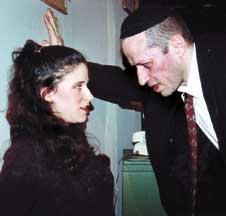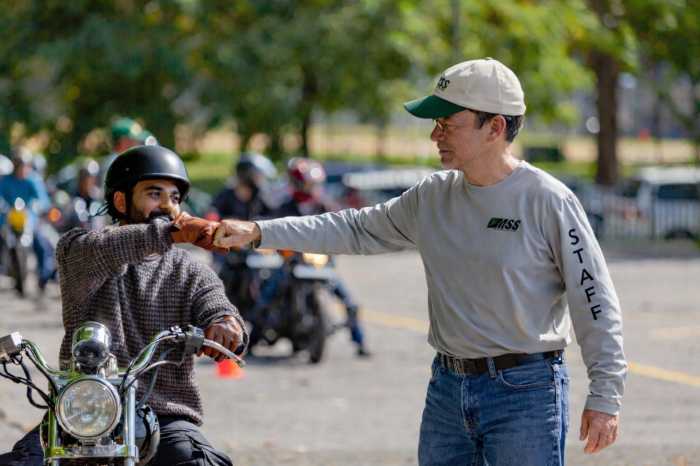Can an insane 18-year-old girl and a suicidal, divorced lawyer
find peace and happiness in a meaningful relationship?
That is the question playwright Paddy Chayefsky asked when
"The Tenth Man" was first staged in 1959. Ever since,
audiences have been laughing and crying as his eloquent drama
explores those possibilities.
The latest revival of "The Tenth Man," now playing
at the Impact Theatre in Prospect Heights, is a sensitive production
directed by Daniel Angus Cox.
Terry Robison plays Arthur Landau, the hapless and unhappy
divorced lawyer who is dragged off the street to complete a prayer
quorum of 10 men one bitter winter morning. In the synagogue
he finds a group of elderly Jewish men, all of East European
origin – Schlissel the atheist (Ron Parella), Zitorsky the philanderer
(Robert Kierman) and Alper the philosopher (Joshua Koehn).
He also finds Evelyn Foreman (Susan Josephs) who has been
kidnapped and brought to the synagogue by her grandfather Foreman
(Paul Campana). Foreman hopes that with the help of his friends
he can exorcise the "dybbuk" he believes has taken
possession of his adored mentally ill grandchild. (In Jewish
folklore, a "dybbuk" is the wandering soul of a dead
person that enters the body of a living person and controls his
or her behavior.)
Evelyn promptly falls in love with Arthur. But Arthur is a
man no longer capable of love. Nor is he capable of leaving Evelyn
to her fate or her demons.
"The Tenth Man" is a drama with little action but
wonderful, expressive dialogue. Chayefsky (1923-1981) peoples
the little synagogue with mystics, philosophers and Biblical
scholars. They have come from the heart of the Old World to this
ramshackle temple set between a dry cleaner and a grocery store
in Mineola, Long Island.
Foreman and Schlissel cannot even find their way to Williamsburg
without getting lost and ending up in New Jersey. But in their
hearts, they are imbued with the wisdom of the ages – a wisdom
that goes beyond geographical boundaries and defies all maps.
"The Tenth Man" was so well written by the three-time
Academy Award-winner for best screenplay – "Marty"
(1955), "The Hospital" (1971) and "Network"
(1976) – that in many ways it might seem foolproof. On the other
hand, without sensitive direction and capable acting there are
no bells and whistles to keep all of that admittedly magical
verbiage moving.
Cox has a cast of capable actors who do not disappoint. Especially
in his two leads. Robison has just the right mix of disdain and
despair for a world-weary lawyer who has everything and enjoys
nothing. At the same time, he is quite capable of becoming passionate
about his lack of passion for this life.
And Josephs is always convincing, whether she’s Evelyn’s alter
ego Hannah Luchinsky, the whore of Kiev and companion of sailors,
or Evelyn, a frightened young woman who has spent her life shuttling
from home to asylum and back home to parents too busy with their
own lives to do much about their daughter’s horror.
The supporting roles are, for the most part, equally strong.
Ken Dray (often seen in Gallery Players and Heights Players
productions) is particularly fine as the harried rabbi who has
reconciled the spiritual and practical aspects of his calling,
building up membership through Bingo, bazaars and baseball.
Dorrell Pulver stands out in what might be considered a minor
role – the overworked sexton who does yeoman’s work every morning
trying to gather 10 men in order to make the required quorum
for prayer.
And 27-year-old Joshua Koehn has obviously studied the stance
and speech of an old man so well that he could probably fool
his own mother.
"The Tenth Man," like the very best in drama and
literature, is based on the theory that love has a redemptive
power that goes beyond age or circumstance. It is love that makes
life worth living. And as Dostoyevsky wrote, hell is nothing
more than the inability to love. In "The Tenth Man,"
the inability to love is represented by the dybbuk, and it is
only by confronting that wandering soul that man and woman can
be redeemed.
As Hirshman the cabalist (Ron Leir) tells Arthur, "It
is better to believe in dybbuks than in nothing at all."
"The Tenth Man" has the misfortune of being staged
by an as yet little-known theater company on a quiet street in
Brooklyn, and opening on a dreary weekend in winter when most
people probably stayed home. But for those who did venture out
to see this outstanding play, the experience was well worth the
effort.
Chayefsy’s classic transcends religion and race, time and
place. It’s one of those plays that remains forever relevant,
as long as people love and long for love, as long as people hope
and despair, then live to hope again.
"The Tenth Man" plays on March 1, 2 and 3 at
8 pm, and Sunday March 4 at 2 pm. Tickets are $15. The theater
is located at 190 Underhill Ave. at the corner of Sterling Place.
For reservations, call (718) 768-0214.

























